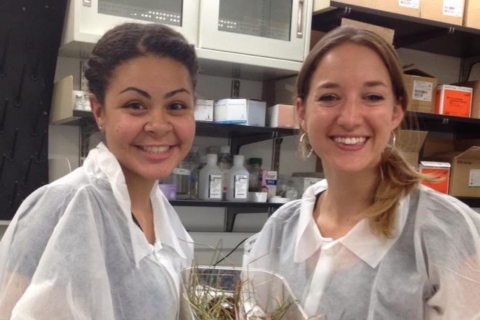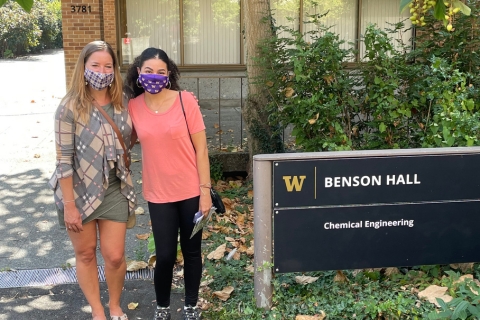By Ro Stastny
July 23, 2024
Chemical engineering Ph.D. student Sydney Floryanzia and Associate Professor Elizabeth Nance were recently named among the 2024 HHMI Gilliam Fellowship student-adviser pairs recognized for their collaboration in innovative research and advancing diversity in STEM.

ChemE graduate student Sydney Floryanzia (left) and Associate Professor Elizabeth Nance
The Gilliam Fellows Program, awarded by the Howard Hughes Medical Institute (HHMI), fosters a robust scientific community that is committed to advancing equity and inclusion. Through this fellowship, student and adviser pairs are recognized and supported through research funding and professional development opportunities. In addition to an annual award of $53,000 for up to three years, Fellows are invited into a diverse community of other scientists where they can engage in leadership training and peer learning. Their mentors also receive specialized training around the best practices for implementing culturally responsive mentorship, cultivating an inclusive research group, and helping trainees to see the joys of leading a research program to tackle complex problems.
For Elizabeth Nance and Sydney Floryanzia, this collaborative partnership began 10 years ago, when Floryanzia was still in high school.
“I had a meeting with one of my mentors in 2014 and told her that I wanted to pursue chemical engineering and combine it with neuroscience,” said Floryanzia, “She told me that she had a former student who just finished her Ph.D. in that very same research area, and then connected me with Elizabeth Nance in an email. From our very first conversation, I knew that our research goals and our common desire to change the world through inclusive STEM education and outreach were very well aligned.”

Floryanzia visits Johns Hopkins University in 2014 to shadow Nance in the lab.
Nance, a postdoc at Johns Hopkins University at the time, invited Floryanzia to shadow her for a day and see the nanotechnology-based therapies they were developing for cerebral palsy. The two continued to keep in touch as Floryanzia earned her bachelor’s degree in chemical engineering from North Carolina State University, where Nance is also an alumna. The mentor who introduced them to each other, Lisa Bullard, is a professor in the department of chemical and biomolecular engineering at NC-State.
Their strong mentor-mentee relationship greatly influenced Floryanzia’s decision to pursue a Ph.D. in chemical engineering at UW and join the Nance Lab to create a tunable, physiological microfluidic blood-brain barrier (BBB) model using primary brain cells. Studying the BBB is critical, as this barrier prevents most molecules of all sizes from accessing the brain, including those from therapeutics that could potentially treat brain disease. Floryanzia’s work in observing and developing living models of brain microvasculature has expanded the Nance Lab’s research and enabled new collaborations with materials scientists and bioengineers. This technological innovation in microfluidic modeling will have a long-standing impact and help identify the necessary design parameters for therapeutics to navigate the human brain effectively.

Sydney Floryanzia poses with Elizabeth Nance outside Benson Hall during her first visit to UW.
“We have already seen where these models allow us to do deeper mechanistic studies to answer questions, like how pericytes interact with nanoparticles,” said Nance, “We’ve never been able to probe that before.”
With the support of this Fellowship, Nance and Floryanzia will be able to continue pushing boundaries both inside and outside of the lab. They have identified an exciting set of goals that will leverage Floryanzia’s BBB expertise and the Nance Lab’s infrastructure to study the ways in which the developing brain responds to stimuli that mimic brain injury in patients.
This work fills a critical knowledge gap in an area that is largely underserved by technology development with the goal of advancing the range of treatment options available for patients, including newborns, with neurological disease in low-and middle- income countries.
Elizabeth Nance currently holds the Jagjeet and Janice Bindra Endowed Career Development Professorship, and is an associate professor of chemical engineering and bioengineering at the University of Washington.